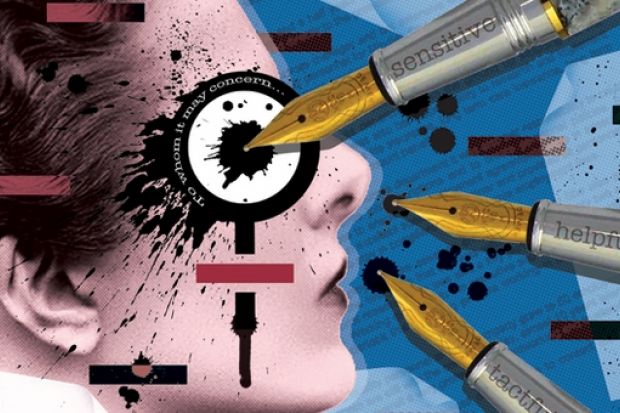Credit: Paul Bateman
Our academic lives are strongly influenced by those individuals who write letters of reference for us as we aim to move up the career ladder.
Generally, although not invariably, these letter writers are people nominated by the candidate. But despite this free choice, there are hidden pitfalls: referees who do not rate the candidate at all highly. It is astonishing to find how rude some people can be about a colleague or an ex-student, and yet the poor unsuspecting candidate may never discover that they should not be using Professor X as their referee. This can be a permanent blight on a career.
However, there are other problems that arise in less conscious ways that may also be significant. Do referees ever stop to consider that they may be conveying something that isn’t really what they intended? Panels may be reasonably expert in reading between the lines: when the referee damns a candidate with faint praise or omits to refer to some critical skill - presumably because the candidate lacks it - this may be spotted and accounted for appropriately. But I am talking about something else here. The adjectives used to describe a candidate in a letter may unconsciously be gendered, carrying unintended subliminal messages. Research has shown this to be the case, whether the letter writers are men or women. Consequently, impressions may be implicitly conveyed that were unintentional. Since I first came across the research demonstrating this effect, I have given much greater thought to the words I use to describe those who ask me to be their referee.
The 2009 work to which I am referring (by J. Madera, M. Hebl and R. Martin in the Journal of Applied Psychology) considered letters of reference written for academics, looking at common adjectives used to describe men and women, and explored how these letters - and the words used - affected the actual hiring decisions. In general, women were more likely to be described by rather passive and emotive words (described in the original paper as “communal” adjectives) such as affectionate, tactful, sensitive and helpful. These are words that may indeed correctly describe any individual, they are not negative words, but they may not be seen as central to the job an academic does. In contrast, men were more likely to be described by so-called “agentic” words - words that stress the active sense of doing, rather than merely being, and words that might be correlated with strength. Adjectives that fit into this category include assertive, dominant, ambitious and intellectual. These words convey a sense of mastery over a field, not a predilection to nurture someone else. The reported analysis demonstrated that the use of these agentic words did not appear to have a significant effect on hiring decisions, but the presence of communal words did. In other words, describing women with stereotypical female words disadvantaged the women. Interestingly, female referees were more likely to use these unhelpful, stereotypical words about women than male writers. One can speculate why this might be, but the concern is that - almost certainly unconsciously and unintentionally - many letters of reference contain words that are damaging to a woman’s case, and hence to her future career.
Academia may be perfectly compatible with family life, many of us (men and women) have demonstrated that this is so; but the ability to care for others - be it family members, distraught students or fellow academics - and as a result to be seen as helpful or sensitive appear not to be valued by search committees at the moment of hiring, however much these skills might be a boon in a department. So, if collectively we, as individuals hiring someone, see these words in a letter of reference, apparently we rate this negatively. This phenomenon needs to be spelled out loudly and clearly so that we can both overcome this negativity and remember that such descriptors are not helpful next time we write a letter of reference ourselves.
It is depressing to realise how much we are prone to make decisions that unconsciously factor in parameters irrelevant to the decision-making process. I’m sure we all think we are virtuous and impartial in our decision-making, but the reality is different. If we see words that are at the “cuddly” end of the spectrum, we don’t rate the candidate, however positive these attributes may be. This being so, we need either to train selection panels to filter out these comments or to train ourselves as reference-letter writers to avoid using words that have these unintended consequences. If we don’t, we are hindering progression towards parity between the sexes in the way we make hiring decisions, with the result that the leaky academic pipeline will continue to leak women at all stages of their careers in ways that could be avoided.
Register to continue
Why register?
- Registration is free and only takes a moment
- Once registered, you can read 3 articles a month
- Sign up for our newsletter
Subscribe
Or subscribe for unlimited access to:
- Unlimited access to news, views, insights & reviews
- Digital editions
- Digital access to THE’s university and college rankings analysis
Already registered or a current subscriber? Login
